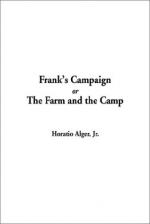“Well,” said John sulkily, “anything you choose.”
“As to the mortgage,” proceeded Squire Haynes, “I have no idea they will be able to lift it. I feel certain that Frost won’t himself have the money at command, and I sha’n’t give him any grace, or consent to a renewal. He may be pretty sure of that.”
“Perhaps he’ll find somebody to lend him the money.”
“I think not. There are those who would be willing, but I question whether there is any such who could raise the money at a moment’s warning. By the way, you need not mention my purpose in this matter to any one. If it should leak out, Mr. Frost might hear of it, and prepare for it.”
“You may trust me for that, father,” said John, very decidedly; “I want to see Frank Frost’s proud spirit humbled. Perhaps he’ll feel like putting on airs after that.”
From the conversation which has just been chronicled it will be perceived that John was a worthy son of his father; and, though wanting in affection and cordial good feeling, that both were prepared to join hands in devising mischief to poor Frank and his family. Let us hope that the intentions of the wicked may be frustrated.
CHAPTER VIII. DISCOURAGED AND ENCOURAGED
In a small village like Rossville news flies fast. Even the distinctions of social life do not hinder an interest being felt in the affairs of each individual. Hence it was that Mr. Frost’s determination to enlist became speedily known, and various were the comments made upon his plan of leaving Frank in charge of the farm. That they were not all favorable may be readily believed. Country people are apt to criticize the proceedings of their neighbors with a greater degree of freedom than is common elsewhere.
As Frank was on his way to school on Saturday morning, his name was called by Mrs. Roxana Mason, who stood in the doorway of a small yellow house fronting on the main street.
“Good morning, Mrs. Mason,” said Frank politely, advancing to the gate in answer to her call.
“Is it true what I’ve heard about your father’s going to the war, Frank Frost?” she commenced
“Yes, Mrs. Mason; he feels it his duty to go.”
“And what’s to become of the farm? Anybody hired it?”
“I am going to take charge of it,” said Frank modestly.
“You!” exclaimed Mrs. Roxana, lifting both hands in amazement; “why, you’re nothing but a baby!”
“I’m a baby of fifteen,” said Frank good-humoredly, though his courage was a little dampened by her tone.
“What do you know about farming?” inquired the lady, in a contemptuous manner. “Your father must be crazy!”
“I shall do my best, Mrs. Mason,” said Frank quietly, but with heightened color. “My father is willing to trust me; and as I shall have Mr. Maynard to look to for advice, I think I can get along.”
“The idea of putting a boy like you over a farm!” returned Mrs. Roxana, in an uncompromising tone. “I did think your father had more sense. It’s the most shiftless thing I ever knew him to do. How does your poor mother feel about it?”




